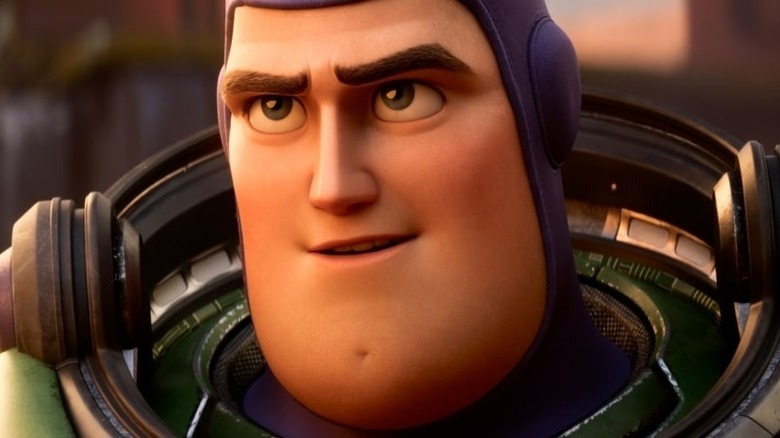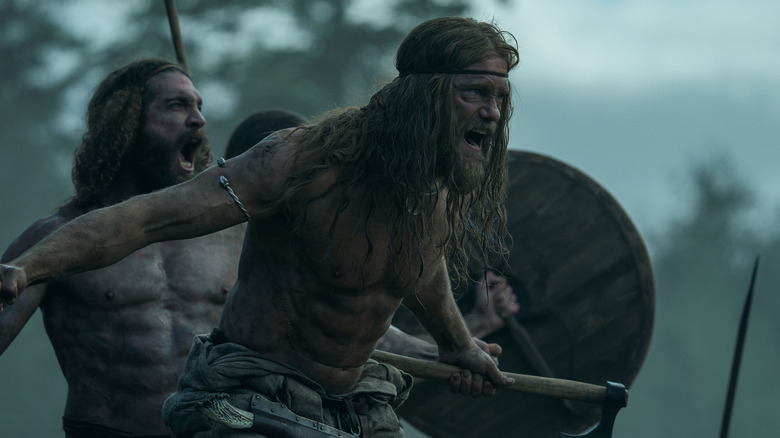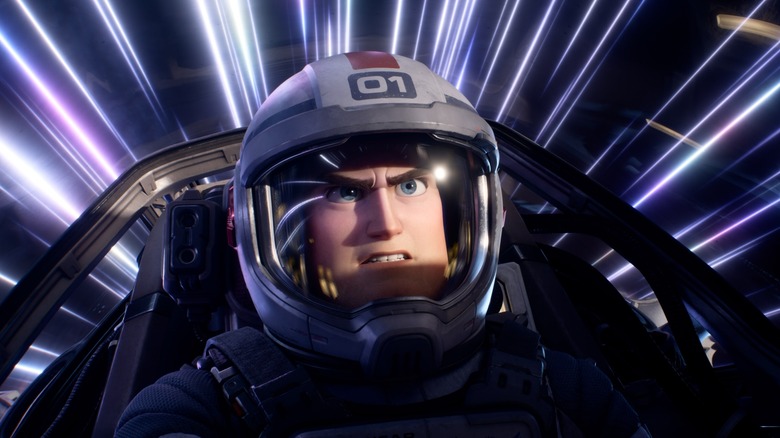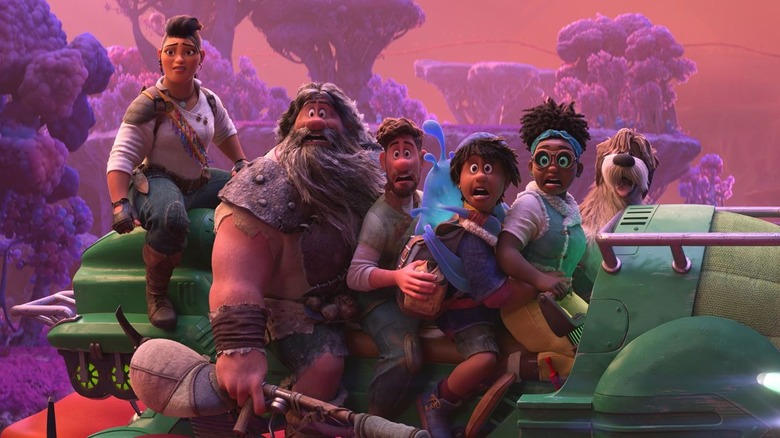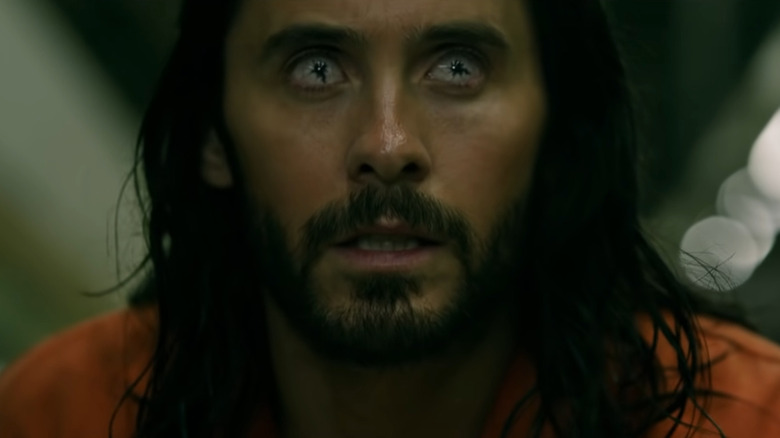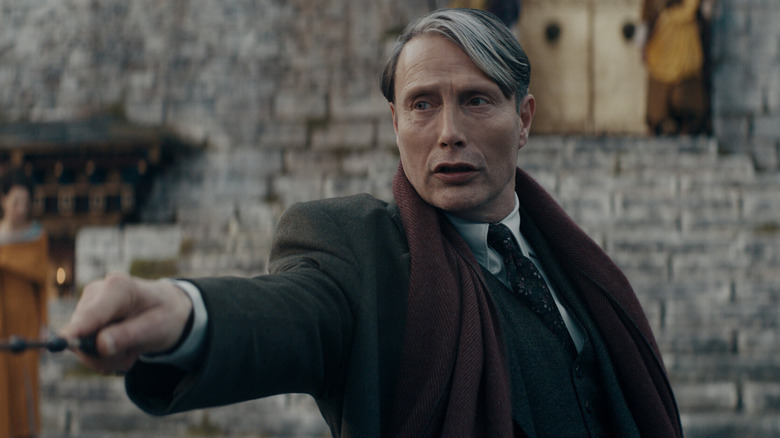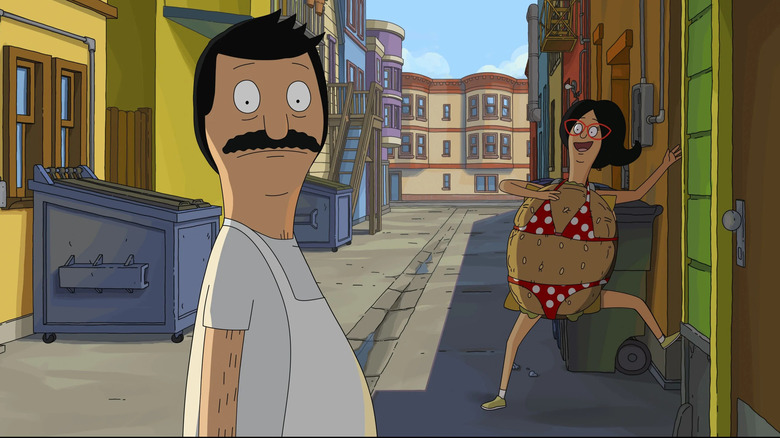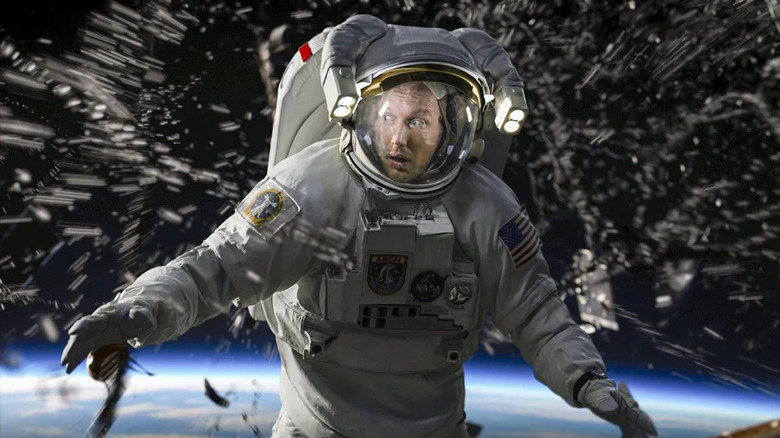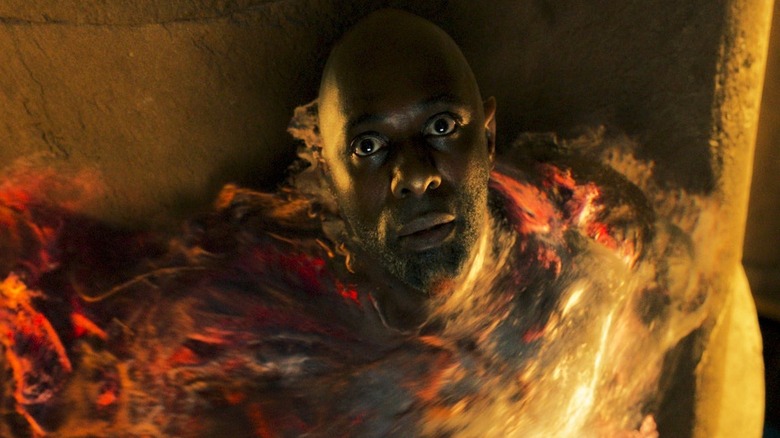The Biggest Movie Flops Of 2022
2022 was a pretty great year for movies, with the release of exciting blockbuster films like "Black Panther: Wakanda Forever" and "The Batman," truly scary horror films like "Barbarian" and "Pearl," to hilarious and inventive comedies like "Everything, Everywhere, All at Once" and "The Menu." Furthermore, with people finally going back to theaters after the height of the COVID-19 pandemic, the global box office is slowly — but surely — climbing back to stronger numbers (though, to be clear, the pandemic isn't truly over, via the CDC).
However, we live under the oppressive boot of capitalism, and the supposed free market needs to have winners and losers to sustain itself, so there have been some horrific flops that were released this year as well. These box office failures range from highly-anticipated Disney CG-animated films to historical passionate projects from acclaimed indie directors, to some films that honestly were doomed from the start by their preposterous premises.
Sadly, like every year, many of the biggest flops of the year weren't even bad films, and some were even great. But that's the nature of doing business in the film industry, we suppose. Anyway, in the sea of flops, what were the ones that tanked the most in 2022? Let's find out in our list below!
The Northman
Robert Eggers is an eclectic filmmaker best known for having a unique, surreal style, having written and directed some truly visually-striking horror films in the past, such as 2015's "The Vvitch" led by Anya-Taylor Joy and 2019's "The Lighthouse" starring Willem Dafoe and Robert Pattinson.
2022's "The Northman" positions itself as an epic historical action film. Set in the 10th century during the reign of the Vikings, "The Northman" itself follows Viking warrior and disgraced prince Amleth (Alexander Skarsgård), who seeks revenge on his evil uncle, Fjölnir the Brotherless (Claes Bang) for killing his father King Aurvandill (Ethan Hawke). Years later, Amleth returns to his homeland as an adult to avenge his family's honor. The film also gets great performances from Nicole Kidman, Bjork, as well as Willem Dafoe and Anya-Taylor Joy.
While it's an admittedly basic story, it is nonetheless a stunning visual treat to witness on screen — especially the climatic fight between Amleth and Fjölnir in the middle of an erupting volcano. Skarsgård, as always, is also a compelling screen presence and is able to lead the film with very few words or expressions. Unfortunately, following a sad history of movies starring Skarsgård that bombed – such as 2012's "Battleship" and 2016's "The Legend of Tarzan" – the film was sent to Valhalla in shame at the box office. In the end, it ended up making just over $69 million on an almost $100 million dollar budget (via Box Office Mojo).
Bros
"Bros" is admittedly not the first mainstream studio LGBTQ+ romantic comedy — with films like 1996's "The Birdcage" starring Robin Williams, as well as 1999's "But I'm a Cheerleader" with Natasha Lyonne preceding it. However, "Bros" was nonetheless still the first released in a while, especially at this scale and budget, costing approximately $25 million (via IMDb), respectively. However, it is the first major film to star an entirely LGBTQ+ cast (via NBC News).
"Bros" is directed by Nick Stoller ("Get Him to the Greek"), and is written by and starring comedian Billy Eichner, best known for Funny or Die show, "Billy on the Street." The plot follows Eichner as an abrasively neurotic and opinionated art curator named Bobby Lieber, who is helping to put together an LGBTQ+ -themed art exhibit in New York City. He also loves (or at least says he loves) being single, using Grindr for quick hook-ups while living a solitary and independent life. That is until he meets Aaron Shepard (Luke Macfarlane), who seems like Bobby's complete opposite. Can they make their relationship work? Watch the film to find out, which we recommend!
Despite great critical reception (via Rotten Tomatoes), the film made less than half of its budget back at the box office (via Box Office Mojo), which is a shame, as, beyond its historical importance as an LGBTQ+ film, it is also just a very funny, heartwarming, and achingly human romantic comedy. Hopefully, it'll get a renewed evaluation in the near future.
Lightyear
The Disney CG-animated "Lightyear" is a spin-off film based on the heroic spaceman toy character Buzz Lightyear from the iconic "Toy Story" franchise. In the original 1995 film, Buzz Lightyear — voiced by Tim Allen — is introduced as the newest, hottest toy of the season, with lights, projectiles, and the ability to do karate chops. It's clear that in the universe of the Pixar Animation Studios films, Buzz is the main character of a fictional, hugely successful sci-fi adventure franchise that spans movies, cartoons, and comics.
Disney then decided to produce "Lightyear," an adaptation of the fictional character that the Buzz Lightyear toy is based on in the "Toy Story" universe. Instead of Tim Allen, Buzz is voiced by "Captain America" star Chris Evans. The concept of "Lightyear" is not really that complicated, but it did cause some confusion with some fans, especially after Evans' now-infamous tweet describing the film which went viral, because back in 2001 the TV series, "Buzz Lightyear of Star Command," where Buzz was voiced by Patrick Warburton, ran for just one season. Sadly, the show doesn't seem to share much — if any — continuity with the film.
"Lightyear" didn't go into infinity or beyond at the box office, making under $120 million dollars domestically, compared to its $200+ million price tag (via Box Office Mojo). Even the worldwide gross — $220 million — doesn't take into account the exorbitant advertising budget.
Strange World
Another Disney CG-animated film that turned out to be a failure at the box office is the adventure story, "Strange World." It cost the studio approximately $200 million, but only netted a quarter of that, earning under $55 million globally (via Box Office Mojo), which is a shame, because it's a fun film that even got favorable reviews (via Rotten Tomatoes).
The story follows super-scientist Searcher Clade (Jake Gyllenhaal), whose famous adventurer father Jaeger Clade (Dennis Quaid) went missing years ago on a dangerous expedition. However, in the present day, the entire world is in now trouble due to an unexplained ecological disaster, and Searcher is the only one who can save the day by traveling into the eponymous "strange world" underneath the planet. Surprisingly, not only does Searcher find out that his estranged father is still alive and has been living in this strange place for decades, but that his son Ethan (Jaboukie Young-White) has snuck onto the mission as well. Luckily — since this is a family film — Ethan finds a way to bridge the gap between the two generations of Clades while saving the world in the process.
The film is worth watching for its unique visuals — both in the diesel-punk designs of its ships and tech, but also in the strange creatures and environment of the world itself. Not only that, but there's some great and unambiguous LGBTQ+ representation, and a prescient and nuanced environmental message as well.
Morbius
The superhero action horror film "Morbius" – starring Jared Leto as the eponymous anti-hero and Living Vampire — is part of Sony's non-MCU "Spider-Man-villains-without-Spider-Man universe" (except for a weird after-credits sequence with Michael Keaton returning as The Vulture), that also includes the two Tom Hardy-led "Venom" films. Unfortunately, unlike those films, "Morbius" was a financial disaster, barely making its budget back domestically, not accounting for the massive marketing push it was given (via Box Office Mojo).
However, if you were to listen to the internet, Sony's big-budget comic book adaptation was a huge commercial success and a critical darling, even getting "praise" from the anti-Marvel Martin Scorsese (via Know Your Meme)! Obviously, none of that is true, but the memes that the film's box office failure generated (which includes the infamous "It's Morbin' Time" line that didn't even actually appear in the film itself) led Sony to somehow re-release the film back into theaters (with Leto embarrassingly referencing the aforementioned meme in real life), which turned out to be even more of a financial failure (via Vulture). Ouch.
Fantastic Beasts: The Secrets of Dumbledore
Despite J.K. Rowling continuing the crusade to burn down her past reputation aggressively and thoroughly (via Vogue), her "Harry Potter" franchise is still highly profitable. There's the continually-packed "Wizarding World of Harry Potter" attraction at Universal Studios in Los Angeles and Florida, an upcoming open-world adventure video game called "Hogwarts Legacy," and Warner Bros. Discovery CEO David Zaslav confirming that "Harry Potter" will be a priority moving forward (via Variety).
One of the only areas where the success hasn't fully translated is the latest "Fantastic Beasts" spin-off film. The latest installment — "Fantastic Beasts: The Secrets of Dumbledore" — made just over $95 million domestically at the box office on a $200 million budget (via Box Office Mojo). Even accounting for global takings, it still made less than half of what 2016's "Fantastic Beasts and Where to Find Them" pulled in.
The "Fantastic Beasts" films are set between 1926 and 1932 and are meant to follow magizoologist Newt Scamander (Eddie Redmayne) as he tries to capture and study magical creatures who found themselves in the Muggle world. However, during this time, the dark wizard — and precursor to the main series' villain Voldemort – Gellert Grindelwald (first played by Colin Ferrell, then Johnny Depp, then finally Mads Mikkelsen) is rising to power. This, on top of the introduction of a young Albus Dumbledore (Jude Law), means that Newt's adventures take a backseat to the point that he becomes a supporting character in the franchise.
The Bob's Burgers Movie
"Bob's Burgers" is an animated sitcom on Fox that debuted in 2011 (has it really been that long?). It stars H. Jon Benjamin (FX's "Archer") as Bob Belcher, the perpetually poor — but nonetheless extremely talented — owner of the eponymous "Bob's Burgers" restaurant, which is also run by the rest of the Belcher family who all live in an apartment above the diner. This includes his lovable and anarchic wife Linda (John Roberts), his awkward oldest teen daughter Tina (Dan Mintz), his creative and eccentric middle son Gene (Eugene Mirman), and his rambunctious troublemaker-with-a-heart-of-gold youngest daughter Louise (Kristen Schaal). Throughout the show, the refreshingly working-class family interacts with many memorable supporting cast members, such as the cheerfully greedy eye-patched landlord Mr. Fischoeder (Kevin Kline).
After running for over a decade, it was decided that The Belchers deserved the big-screen treatment, which makes sense, as many animated series-turned-feature films have had great success, such as "South Park: Bigger, Longer, Uncut," "Beavis and Butt-Head Do America," and "The Simpsons Movie," among others.
Unfortunately, "The Bob's Burgers Movie" wasn't able to catch on with audiences outside of the television screen. Despite being well-received critically (via Rotten Tomatoes), the film, unfortunately, made less than its budget not accounting for marketing (via Box Office Mojo). At least it keeps in line with Bob's burgers — they're critically well-regarded, but he doesn't make a lot of money off them.
The 355
The explosive action spy thriller "The 355" boasts a seemingly can't-miss cast of amazing actresses, including Jessica Chastain, Penélope Cruz, Fan Bingbing, Diane Kruger, and Lupita Nyong'o, all playing international agents trying to save the world from terrorists. Directed by Simon Kinberg ("X-Men: Dark Phoenix"), "The 355" follows a pretty generic — albeit serviceable — plot about spies from different countries struggling to trust and work together and stop the aforementioned global threat. The direction is surprisingly competent, with relatively fun action sequences. Whatever flaws the film has, it at least seems clear that the stars put in a lot of work with the stunts and fight choreography.
However, despite the great all-star cast and competent action scenes, the movie, unfortunately, failed spectacularly at the box office, making just over $25 million against a $75 million budget (via Box Office Mojo). Hopefully, this doesn't deter Hollywood from making more female-led action films, as tons of failed spy flicks starring men have existed over the years, and the industry never seems to think audiences hate seeing male action heroes. Women should be afforded the same grace. We'll see.
Moonfall
Director Roland Emmerich is best known for big-budget disaster movies, such as "Independence Day," and "The Day After Tomorrow" where entire cities explode as all-star casts trade quips amongst the destruction. While Emmerich has done other types of films — such as the Shakespeare conspiracy film "Anonymous" — disaster films are his bread-and-butter.
Meanwhile, his sci-fi disaster epic, "Moonfall" probably contains the most devastating threat to the world so far, because it is literally about the moon falling to Earth. The film follows disgraced astronaut Brian Harper (Patrick Wilson), who is recruited by his former colleague Jocinda "Jo" Fowler (Halle Berry) to go on a desperate space mission along with a conspiracy theorist, K.C. Houseman (John Bradley), who first finds out about the eponymous moonfall — to discover the cause of it and if there's any way to stop it.
While the film's premise is of course ridiculous, that's not really a problem for an Emmerich film. The reason people flock to his disaster films is the over-the-top and explosive destruction scenes, and "Moonfall" mostly delivers. This includes a scene where New York City gets entirely sucked up by the moon's gravitational pull. Unfortunately, despite those aforementioned VFX sequences, it unfortunately crashed and burned harder than the moon in the film did, making a little over $67 million on a nearly $150 million budget (via Box Office Mojo). Even worse, the film ends on a preposterously sequel-baiting note, with Houseman and aliens that won't ever come to fruition.
Three Thousand Years of Longing
The Australian auteur George Miller has had an expansive and eclectic film career over the years. For one, he is the mastermind behind the "Mad Max" franchise, which — besides being awesome action films in their own right — also pretty much dictated the aesthetic of post-apocalyptic genre movies since then. However, he is also responsible for writing and directing other popular films that wouldn't necessarily seem to fit his oeuvre at first glance such as "Babe: Pig in the City" and the CG-animated "Happy Feet" films.
After Miller's decades-later "Mad Max" reboot "Mad Max: Fury Road" become a smash critical and commercial success, he was given a blank check to do whatever passion project he wanted afterward. So, of course, Miller zagged-instead-of-zigged, and decided to write and direct the visually stunning — but commercially unviable — "Three Thousand Years of Longing." The film itself is a surreal fantasy romance between a magical genie (Idris Elba) and a lonely woman named Alithea (Tilda Swindon), to whom he regales tales from his past.
While the film got mixed-to-positive reviews (via Rotten Tomatoes), it unfortunately only made a third of its $60 million budget back (via Box Office Mojo). Hopefully, Miller's wish for another success will come true soon, as he revs up to write and direct the "Furiosa" prequel as his next project (via Variety).
